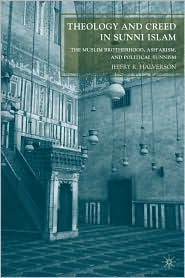The following is a summary of some arguments from my new book, Theology and Creed in Sunni Islam: The Muslim Brotherhood, Ash’arism, and Political Sunnism, published by Palgrave Macmillan. It offers an explanation of why fundamentalist literal interpretations of the Qu’ran have so much influence in contemporary Islamist extremism, and why extremists’ views about what the Qu’ran says can be so difficult to challenge.
Mohammed Arkoun has described the notion of the “unthinkable” in Islamic thought, referring to the expansive realm of the intellectually forbidden. In recent decades, this realm has been greatly fortified. But among the pre-modern casualties of the “unthinkable,” there was a surprising fatality, the discipline of Sunni theology (‘ilm al-kalam). Through a complex confluence of events, kalam fell into steady decline during the waning of the ‘Abbasid Caliphate and into virtual extinction as an active discipline by the fifteenth century (CE), replaced by a distinctly creedal enterprise.
Theology is the systematic, rational, defensible articulation of religious beliefs about God, revelation, and the cosmos. Therefore, when I describe the demise of Sunni theology I am referring to theology in this technical sense and not the disappearance of particular axiomatic religious creeds, called ‘aqidah (“creed”). Nor am I referring to Islamic philosophy, a separate discipline known as falsafah.
Among the leading factors behind the demise of kalam was an anti-theological school of thought that opposed the classical theological enterprise as it responded to a range of sociopolitical concerns, principally from the seventh to tenth centuries (CE). This movement, known as the Athariyya, stressed strict adherence to the literal outward meanings of the sacred texts. For the Atharis, human reason cannot be trusted in matters of religion, thus making theology a sinful (even satanic) and dangerous exercise in human arrogance. Following the demise of kalam, Athari thought has flourished and, I argue, contributed in important ways to the reformulation of Islamic political theory in the twentieth century commonly known as “Islamism.”
This new Islamic polity borrowed heavily from modern European political ideologies and centered on the so-called “Islamic state.” In this book, I propose a new definition of Islamism, articulated in great detail, as the marriage of Athari-imposed creedalism and the modern-nation state. The turmoil and bloodshed that the Muslim world endured in the early centuries, out of which the dominant schools of Sunni theology (e.g. Ash‘arism and Maturidism) eventually emerged with important resolutions, is now being forced to play out once again, with the most dangerous elements emanating from those factions opposed to theology as a satanic force and a deserving prisoner of the “unthinkable.”
For more from this title, please visit Barnes & Noble or Amazon



